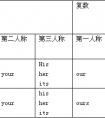按要求改写下列句子,每空一词。 1. There is a shoe shop near my home. (改为复数句子)There ________ ________ ________ ________near my home. 2. There are some p-七年级英语
map→maps
girl→girls
factory→factories
party→patries
boy→boys
key→keys
life→lives
wife→wives
half→halves
tomato→tomatoes
hero→heroes
zoo→zoos
妻子骑牛拿起刀,wife,calf,knife ↑
追得贼狼满街跑,thief,wolf →→→变f或fe为v,再加es
碰倒架子丧己命,shelf,self,life ↓
手帕树叶半空飘。handkerchief,leaf,half ↓
1.不规则形式:
child→children(儿童)
man→men(男人)
woman→women (女人)
an Englishman→two Englishmen(英国人)
foot→feet(脚)
tooth→teeth(牙)
mouse→mice(老鼠)
ox →oxen(公牛)
goose→geese(鹅)
2.单复同形:
deer,sheep,fish,Chinese,Japanese, species,means,Swiss
除人民币,美元、英镑、法郎等都有复数形式。
如:a dollar,two dollars; a meter,twometers
3.集体名词,以单数形式出现,但实为复数:
people police cattle是复数
(OK :a person,a policeman,ahead of cattle,the English,the British,the French,the Chinese,the Japanese,the Swiss )
(Error:a people,a police,a cattle )
表示国民总称时,作复数用。
(The Chinese are industries and brave. 中国人民是勤劳勇敢的。)
4.以s结尾,仍为单数的名词
maths,politics,physics等学科名词,为不可数名词,是单数。
news是不可数名词。
5.表示由两部分构成的东西,
glasses(眼镜) trousers (长裤) clothes(衣服)
若表达具体数目,要借助数量词pair(对,双)a pair of glasses two pairs of trousers suit(套)
6.另外还有一些名词,其复数形式有时可表示特别意思
goods (货物) waters (水域) fishes (各种鱼)
1) 单数名词加s: students, apples, bags, trees, books, brothers.
2) 以s、x、sh、ch结尾的名词加es: glasses, boxes, brushes, matches.
3) 以辅音字母加y结尾的名词,变y为i加es: cities, babies, enemies.
4) 以f或fe结尾的名词,多数变f为v加es: wives, knives.但有些词只加s: roofs,proofs, chiefs.
5) 以o结尾的名词,有些加es: Negroes, heroes, tomatoes, potatoes. 其它加s: radio s, zoos, pianos, photos.
6) 不规则名词:foot→feet, goose→geese, tooth→teeth, child→children, man→men, woman→women, mouse→mice.
7) 单复数同形的名词:sheep,fish,dee.
注意:fish表示种类时,也用fishes这样的形式。
考点名称:疑问代词
疑问代词:
疑问代词在句中起名词的作用,用来构成疑问句。常用的疑问代词有:
what, who, whose, whom, which, whatever, whichever, whoever, whomever
疑问代词在句中应位于谓语动词之前,没有词性和数的变化,除who之外也没有格的变化。
what, which, whose还可作限定词。
Whose books are these on the desk?
桌上的书是谁的?
What was the directional flow of U. S. territorial expansion?
美国的领土扩张是朝哪个方向的?
What events led to most of the east of the Mississippi River becoming part of the United States?
哪些事件使密西西比河以东的大部分土地归属于美国?
疑问代词在句中起名词词组的作用,用来构成疑问句。疑问代词有下列几个:
指 人: who, whom, whose
指 物: what
既可指人又可指物: which疑问代词说明:
一、无论是做疑问代词还是限定词,which 和 what 所指的范围不同。what所指的范围是无限的,而which则指在一定的范围内,例如:
Which girls do you like best?
你喜欢哪几个姑娘?
What girls do you like best?
你喜欢什么样的姑娘?二、Whom是who的宾格,在书面语中,它作动词宾语或介词宾语,在口语中作宾语时,可用who代替,但在介词后只能用whom, 例如:
Who(m) did you meet on the street?
你在街上遇到了谁?(作动词宾语)
Who(m) are you taking the book to?
你要把这书带给谁?(作介词宾语,置句首)
To whom did you speak on the campus?
你在校园里和谁讲话了?(作介词宾语,置介词 后,不能用who取代。)三、疑问代词用于对介词宾语提问时,过去的文体中介词和疑问代词通常一起放在句首,现代英语中,疑问代词在句首,介词在句未,例如:
For what do most people live and work?大部分人生活和工作的目的是什么?(旧文体)
What are you looking for?你在找什么?(现代英语)四、疑问代词还可引导名词性从句,例如:
I can't make out what he is driving at.
我不知道他用意何在。
Can you tell me whose is the blue shirt on the bed?
你能告诉我床上的蓝衬衣是谁的吗?
Much of what you say I agree with, but I cannot go all the way with you.
你说的我大部分同意,但并不完全赞同。- 疑问代词用法:
1. 疑问代词有who, whom, whose, which和what, 都是用来构成疑问句的:
Who is calling? 谁打电话来?
Whom do you want to speak to? 你想找谁接电话?
作主语时用who,作宾语时用whom,在口语中用who作宾语时也不少:
Who did you mean? 你指的是谁?
Who are you talking about? 你们在讲谁?
直接跟在介词后时只能用whom:
With whom did you come? 你和谁一道来的?
(口语中说“Who did you come with?时更多一些。)
2. 其他三个疑问代词可用作:
1)主语:
What’s your address? 你的地址怎样写?
Whose is better? 谁的好一些?
Which of these is yours? 哪一本是你的?
2)宾语:
What do you mean? 你是什么意思?
Which do you like better? 哪一个你更喜欢一些?
Whose have you chosen? 你选了谁的?
3)表语:
What’s her name? 她叫什么名字?
Whose is it? 这是谁的?
4)定语(这样用时有些字典标作形容词):
What time does the train leave? 这列火车什么时候离开?
Which room shall we stay in? 我们住哪间房?
Whose passport is this? 这是谁的护照?
考点名称:祈使句
- 祈使句:
表示请求或命令的句子是祈使句。祈使句一般用降调,为使祈使句听起来比较婉转,可用低声调,祈使句句末用句号或感叹号。
每种类型又有肯定形式和 祈使句的组成
①动词原形+其他
②Please+动词原形+其他
③否定形式:don‘t+动词原形,用don’t否定时,只能用其缩略形式。
例如:
Welcome to Beijing Park.
Walk about three blocks.
Don’t mention it.
<?xml:namespace prefix = "o" ns = "urn:schemas-microsoft-com:office:office" />
祈使句的含义:
1. 表请求
Pass me the sugar, please. 请把糖递给我。2. 表命令
Put up your hands. 举手。
Fill in this form. 把这个表填好。
- 最新内容
- 相关内容
- 网友推荐
- 图文推荐
| [家长教育] 孩子为什么会和父母感情疏离? (2019-07-14) |
| [教师分享] 给远方姐姐的一封信 (2018-11-07) |
| [教师分享] 伸缩门 (2018-11-07) |
| [教师分享] 回家乡 (2018-11-07) |
| [教师分享] 是风味也是人间 (2018-11-07) |
| [教师分享] 一句格言的启示 (2018-11-07) |
| [教师分享] 无规矩不成方圆 (2018-11-07) |
| [教师分享] 第十届全国教育名家论坛有感(二) (2018-11-07) |
| [教师分享] 贪玩的小狗 (2018-11-07) |
| [教师分享] 未命名文章 (2018-11-07) |

![—I want to know if ______ a concert in our school hall this weekend. —Yes. Nancy told me about it. [ ]A. there will have B. there will be C. will there be -九年级英语](http://www.00-edu.com/d/file/ks/4/2/there be juxing/2020-02-28/small8bcf29e494d6f99c2d7c4286c4836a101582899344.jpg)
![There_____ a potato and two tomatoes on the table. [ ]A. isB. areC. hasD. have-七年级英语](http://www.00-edu.com/d/file/ks/4/2/there be juxing/2020-02-28/small596b7df57071a5318d44b4246a8dfcf71582899941.jpg)

![Will there___any schools in the future?[ ]A. isB. areC. amD. be-七年级英语](http://www.00-edu.com/d/file/ks/4/2/there be juxing/2020-02-28/smallfaad594ad286847556f8b2a7bf4e6da41582899915.jpg)
![There is going to _____English movie tonight. [ ]A. be B. be an C. have D. have an -八年级英语](http://www.00-edu.com/d/file/ks/4/2/there be juxing/2020-02-28/small684c03bf16377c6f94e9f828954421a91582899285.jpg)
